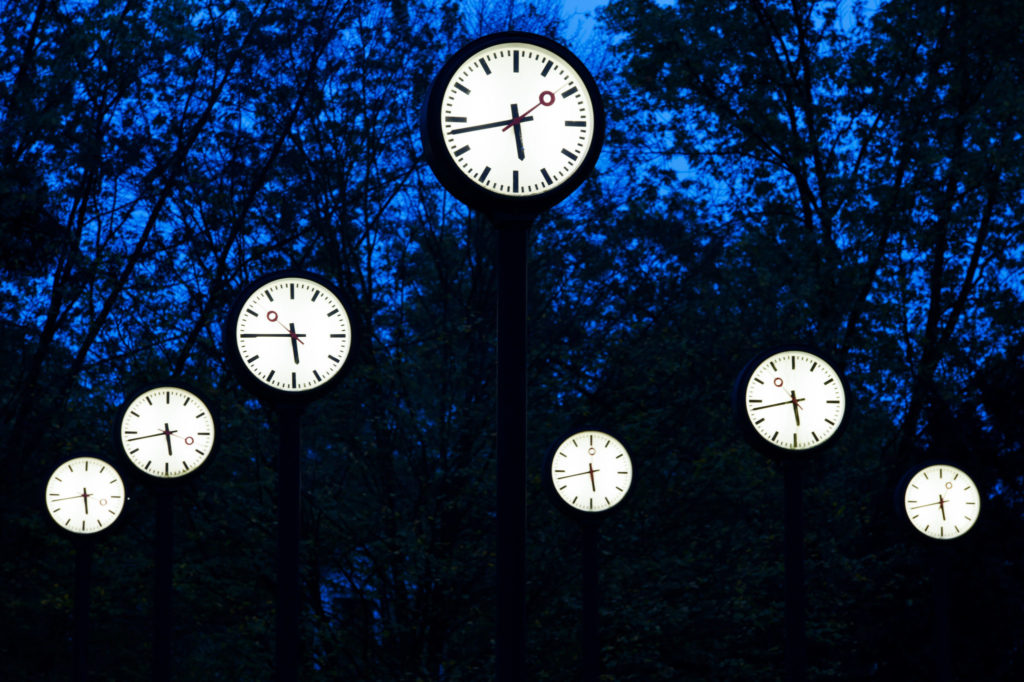'Winter time' hits Ireland at 2am this Sunday, meaning the clocks go back one hour.
This change will see more sunlight in the mornings but darker evenings.
The clocks will change again on Sunday March 31st next year.
However the annual change, known as Daylight Saving Time, has again raised the debate about its necessity in the first place.
MEPs voted to end the practice of adjusting clocks twice a year from 2021.
The proposal for change followed a major public consultation in 2018, which received 4.6 million responses from all member states.
Of these, 84% were in favour of discontinuing the biannual clock changes - while 16% wanted to keep them.
While 88% of Irish people who took part in the survey wanted the change abolished - with only 12% suggesting it should stay.
 File photo shows public clocks in Duesseldorf, Germany. Image: Lisa Ducret/DPA/PA Images
File photo shows public clocks in Duesseldorf, Germany. Image: Lisa Ducret/DPA/PA ImagesHowever the Government here has since said it would not make any change that would see two time zones on the island of Ireland.
Fine Gael Senator Tim Lombard said he believes its time has well and truly passed.
“84% voted to stop the seasonal clock changes and on foot of this, in 2019, the European Parliament voted to remove daylight energy saving time permanently," he said.
"The initial plan was to stop seasonal time changes after spring 2021, but this was put on hold due to the COVID-19 pandemic.
“Since then, there has been complete inertia on this issue, despite the strongest evidence which tells us that stopping the practice of changing our clocks twice a year would bring multiple benefits."
'People's mental health'
Senator Lombard said removing the time change would see benefits for everyone.
"As a farmer and a parent of young children, I see the benefits that brighter evenings bring at home and in my work," he said.
"We all face this Sunday morning with a certain amount of dread, knowing that darkness will fall earlier that evening and every evening for the next six months.
"These longer evenings impact negatively on people’s mental health; particularly older people or those living alone."
Senator Lombard said people are move active now.
“We are increasingly a more active population and limited daylight hours make it harder for people to participate in outdoor pursuits and exercise," he said.
"Notably, women feel less inclined to exercise or socialise outdoors after dark as they fear for their safety.
"In addition, the Road Safety Authority has said almost twice as many pedestrians were killed at night than during daylight hours in 2022 and nearly half of the pedestrian fatalities in 2022 occurred between October and December and the hours between 4pm and 7pm are the most dangerous on the roads."
'Countries with different time zones'
Senator Lombard said more daylight could also mean cheaper energy bills.
"Our energy consumption is also hugely dictated by our daylight outs and minimising the darker time over the course of a day would minimise our energy bills," he said.
He also dismissed suggestions of there being any issue with two time zones in Ireland.
“Some opposed to scrapping DST say that we run the risk of being in a different time zone to the UK, should the European Parliament introduce a directive, as Ireland is in the European Union and the UK is not.
"Spain and Portugal are two neighbouring countries with different time zones and it does not impact on their co-existence.
"I’m also aware that a Justice Committee in the UK is currently examining the matter, so they may in fact forge ahead and take their own decision regardless.
"Progress on a myriad of issues halted during COVID, but there is no excuse for the European Commission not to place this high up on the agenda now.
"The European elections are scheduled for next June and this is set to be an issue of concern to millions of Europeans.
"The practice of adjusting the clock twice a year seems out of step with the world we live in today, so the time is now to make the decision to scrap DST," he added.









